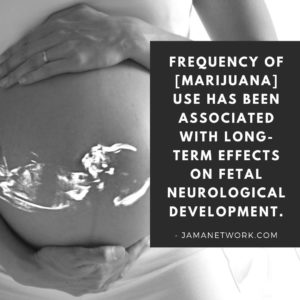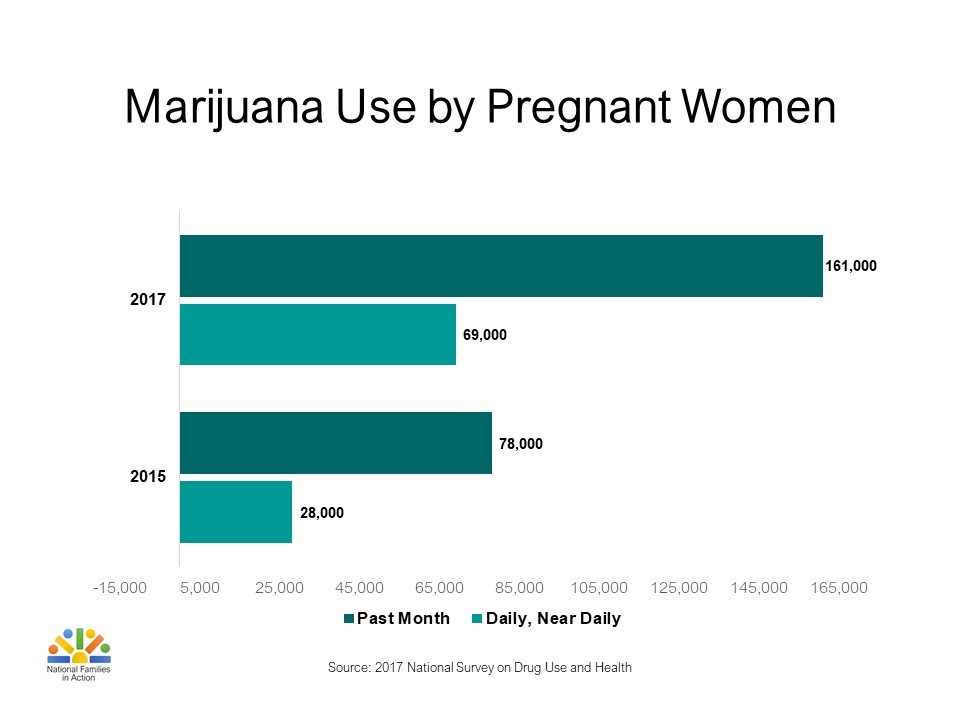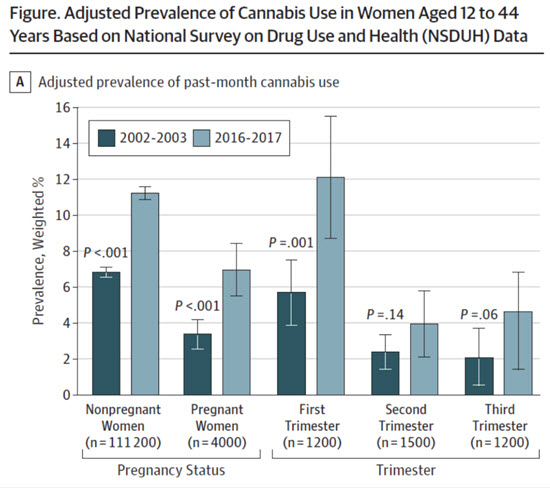MORE BABIES FAILING DRUG TESTS
 Legalisation of marijuana has led to major concerns around pregnant mums using the drug (including as a treatment for morning sickness), and an increase in the number of babies being born THC-positive.
Legalisation of marijuana has led to major concerns around pregnant mums using the drug (including as a treatment for morning sickness), and an increase in the number of babies being born THC-positive.
A clinical report published in the September 2018 Pediatrics cites statistics showing that more babies than ever are being exposed to marijuana. With marijuana now legal for medical or recreational use in more than half of U.S. states, marijuana use among pregnant women increased by 62% between 2002 and 2014 nationally. Meanwhile, marijuana has become more potent, with average concentrations of the psychoactive compound tetrahydrocannabinol (THC) more than quadrupling since the 1980s.
Christian Thurstone, director of the STEP Programme at Denver Health – one of Colorado’s largest youth substance-abuse treatment programmes – has conducted extensive research regarding marijuana and the developing brain. His research shows that children exposed to marijuana in utero have a 5-point decrease in IQ at age 6; a greater chance of depression, hyperactivity and impulsivity at age 10; and lower school achievement at age 14.
Approximately 70% of randomly selected medical marijuana centers in Colorado recommended marijuana as a treatment for morning sickness for pregnant women. Doctors caution that marijuana’s effects on a fetus could include low birth rate and developmental problems.
Colorado’s legalisation of recreational marijuana has led to an increase in the number of babies being born THC-positive. One Pueblo hospital is reporting nearly half the babies tested in one month had marijuana in their system.
 According to a National Public Radio (US) report, a number of studies nationally suggest there’s been a sharp jump in pot use among pregnant women, especially among younger mothers… Researchers say psychoactive compounds in marijuana easily cross the placenta, exposing the fetus to perhaps 10 percent of the THC — tetrahydrocannabinol — that the mother receives, and higher concentrations if the mom uses pot repeatedly. Studies show marijuana increases the risk of stillbirth and adversely affects how a baby’s brain develops. Studies also show these kids may have behavioral problems at higher rates than other children by the age of 14, and are at greater risk for initiating marijuana use.[9]
According to a National Public Radio (US) report, a number of studies nationally suggest there’s been a sharp jump in pot use among pregnant women, especially among younger mothers… Researchers say psychoactive compounds in marijuana easily cross the placenta, exposing the fetus to perhaps 10 percent of the THC — tetrahydrocannabinol — that the mother receives, and higher concentrations if the mom uses pot repeatedly. Studies show marijuana increases the risk of stillbirth and adversely affects how a baby’s brain develops. Studies also show these kids may have behavioral problems at higher rates than other children by the age of 14, and are at greater risk for initiating marijuana use.[9]
When mothers use marijuana during the first 12 years of their child’s life, their cannabis-using children are more likely to start at an earlier age than children of non-using mothers, according to a new study from the Harvard T.H. Chan School of Public Health published in the American Journal of Preventive Medicine in September. This study is the first to establish a relationship between maternal cannabis use during a child’s lifetime and earlier initiation in a nationally-representative, longitudinal cohort.
The National Survey on Drug Use and Health found that 28% of women living in low-income areas tested positive for marijuana use during pregnancy. Another study by the American College of Obstetricians and Gynecologists reported that young women from lower income levels have a 15–28% rate of marijuana use during pregnancy. Up to 60% of these young women continue marijuana use throughout pregnancy due to a decreased perception of risk and stigma.
Source: http://themarijuanareport.org/wp-content/uploads/sites/3/2018/09/Marijuana-Use-by-Pregnant-Women-Front.jpg
UPDATE June 2019: Marijuana use among pregnant women doubles
 A new study finds that marijuana use doubled among pregnant women between 2002 and 2017 and is most common in the first trimester. Past-month marijuana use increased from 3.4 percent to 7 percent among pregnant women overall. The data came from an analysis of the National Survey on Drug Use and Health between 2002 and 2017, which involved nearly half a million women. And a July study based in California found that the frequency with which women in California use cannabis in the year before and during pregnancy has increased over time, corresponding with increasing acceptance of cannabis use and decreasing perceptions of cannabis-associated harms. The data indicates that cannabis is used differentially and disproportionately by the young, the poor and racial minorities.
A new study finds that marijuana use doubled among pregnant women between 2002 and 2017 and is most common in the first trimester. Past-month marijuana use increased from 3.4 percent to 7 percent among pregnant women overall. The data came from an analysis of the National Survey on Drug Use and Health between 2002 and 2017, which involved nearly half a million women. And a July study based in California found that the frequency with which women in California use cannabis in the year before and during pregnancy has increased over time, corresponding with increasing acceptance of cannabis use and decreasing perceptions of cannabis-associated harms. The data indicates that cannabis is used differentially and disproportionately by the young, the poor and racial minorities.
A study in the June 2019 edition Journal of the American Medical Association also reported a sharp increase in the number of pregnant women smoking marijuana and an alarming link between cannabis use and preterm births, defined as 37 weeks or earlier. Canadian researchers compared the outcomes of birth by 5,639 mothers who reported cannabis use during pregnancy with 92,873 mothers who said they didn’t use it. The authors concluded marijuana is “likely unsafe” because pre-term births were twice as common in marijuana users vs. non users. (12% vs 6.1%). Source
Use marijuana while pregnant, and your child is more likely to suffer sleep problems as much as a decade later, according to a new University of Colorado Boulder study of nearly 12,000 youth. Published in Sleep Health: The Journal of The National Sleep Foundation, the paper is the latest to link prenatal cannabis use to developmental problems in children and the first to suggest it may impact sleep cycles long-term. “Mothers who said they had used cannabis while pregnant were significantly more likely to report their children having clinical sleep problems,” said Winiger, a graduate student in the Department of Psychology and Neuroscience. Those who used marijuana frequently were more likely to report somnolence symptoms (symptoms of excess sleepiness) in their children, such as trouble waking in the morning and being excessively tired during the day.

According to a new Canadian study published in Nature Medicine, women who use marijuana during pregnancy have a more than 50 percent greater chance to give birth to a child with autism versus non-users. The study also found the risk for other neurodevelopmental disorders was heightened. The study looked at data from over 500,000 women living in Ontario, Canada. Of those, about 3,000 reported using marijuana during pregnancy, while 2,200 reported using marijuana and no other substances. Researchers found that 2.2 percent of mothers who used marijuana during pregnancy had children with autism compared to 1.4 percent of women who did not but were of similar age, education level, and other characteristics.
REPRODUCTIVE HEALTH
 In an article published in the Canadian Medical Association Journal, researchers say they want doctors and patients trying to conceive to be aware that smoking marijuana might make it more difficult. How?
In an article published in the Canadian Medical Association Journal, researchers say they want doctors and patients trying to conceive to be aware that smoking marijuana might make it more difficult. How?
- erectile dysfunction in men and infertility in women.
- decreased sperm count.
- delayed or no ovulation
- prenatal exposure to marijuana and problems for the child
A Danish study published in the American Journal of Epidemiology found that smoking marijuana more than once a week reduced sperm count by 29% in guys 18 to 28 years old.
When men smoke marijuana once a week or more, their partners are twice as likely to experience a miscarriage when pregnant, according to Boston University researchers who examined over 1,400 couples before they got pregnant. Smoking, but less frequently than once a week, did not have an association with miscarriage rate, according to the research. One reason for the increased risk of miscarriage with male marijuana use, according to researchers, is that smoking marijuana may negatively affect sperm quality and the change in sperm quality may drive the increased occurrence of miscarriage.
There’s new evidence that a daily marijuana-smoking habit could increase your risk of testicular cancer. A study published in December 2019 in JAMA Network Open found that men who smoked one marijuana cigarette, or joint, daily for 10 years or more had an estimated 36 percent increased risk of developing testicular cancer compared with men who had never smoked the substance.
